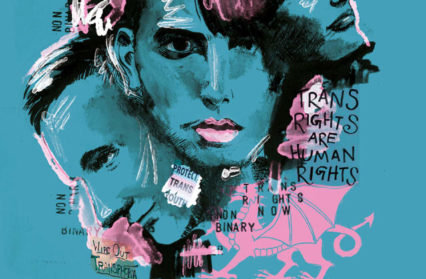Humanequin: Mess up the Mess is a production by Youth Cymru \ Mess Up the Mess that voices the lived experiences of young trans adults as part of a TransForm project.

In 2014, Mess Up The Mess began work with a group of young trans people from the Youth Cymru’s TransForm project. Cut to 2018, and director Jain Boon and writer Kelly Jones have teamed up to give stage and voice to the lived experiences of these young trans adults. Humanequin is performed in the Wales Millennium Centre’s Weston Studio, and the intimate theatre has unreserved seating. It’s a noteworthy point, for nearly half an hour before the play begins there are already hordes of people waiting outside. There are crowds of friends standing in circles, the air filled with the happy buzz of chatter. Not one soul in the theatre, and already one of the play’s most prevalent themes is alive all around – that is, the importance of community. You can feel the expectation, it’s almost nervous energy; this isn’t just any other play, it matters a great deal. What a relief then that it’s an undoubted success.
The minimal set for this TransForm project consists mainly of large metal gates which are wheeled about by the actors; though it’s not always clear what these are meant to literally represent, the feelings they encapsulate are obvious: isolation, claustrophobia, alienation. Each feeling, in turn, is evoked vividly by the characters. The play pivots around the stories of three protagonists – Rae (Sammy Woodward), Max (Harry Bryant) and Meg (Emily Joh Miller). Creating a tricycle of a narrative is no mean feat; switching between each story is a challenge met by both writer and director. I’m sure there must have been at least a slight temptation to marry each monologue to the next, in an attempt at seamless fluidity. Ultimately, Jones’ choppy stop/start effect has a far greater impact. Much like chapters in a book, each character ends their segment on something of a cliff-hanger; it does great things for the play’s tempo, which keeps up – without lull – for the entirety of its running time. Very occasionally, the challenges of a threadbare set and multi-stranded narrative can make it difficult to follow the plot to a T, but with such vibrant characters to carry the audience through, the little patience required is no bother at all. One thing’s for sure, nobody is yawning.
When it comes to art created by, or about, the LGBTQ+ community, reviewers are often hasty to pin down the piece’s outlook – “ultimately optimistic” or “a gritty commentary”. The idea seemingly being that the work should come with some kind of social forecast, suggest to the viewer whether things are getting better, or just becoming ever bleaker. With this in mind, it is a pleasure to say that Humanequin is brimming with a complexity of emotions that are not easily sorted – each shade as varied as the characters’ lives that play out on stage. There are small victories and big losses, but at its heart, this play isn’t about what the world thinks of trans people, but what it is to exist in the world as somebody who is trans. Blockbuster films such as The Danish Girl and Dallas Buyers Club have – time and time again – put the power of trans stories into the hands of cis actors; watching Humanequin it is desperately clear what missed opportunities these movies really were.
Woodward, Bryant and Miller give the impassioned performances of actors with a thorough understanding of their script; each of them has the raw ability to deliver lines capable of sending shivers down spines. Though to be clear, Humanequin pushes far past the realm of a mere tear-jerker, it is heart-squeezing. There are damp eyes throughout, and not always from something as one-note as sadness – because Humanequin is more than just sad. It speaks to the joys of the fostered families found within the LGBTQ+ community, and – as with any family – the tensions and jealousies which can often come along with them.
Among the vast variety of plots, characters and themes is a single thread that runs dominant throughout, and that is one of loss. Whether it be the loss of family, respect, safety or – most pressingly – the loss of trans lives. By the time the lights come up, attention floats to the memorial tree which sits at the side of the stage. Its leaves are made up of brown tags which have been added throughout the week’s performances – audience members are invited to leave a message about the play, pledge to create a more equal world, or, write the name of someone they have lost. As I get up from my seat – the play still washing over me – I wonder what to put while unhesitating pens scratch audibly, writing all around me.
You can find out more about Humanequin, a production by Youth Cymru for their TransForm project through their website.
Caragh Medlicott is a regular contributor to Wales Arts Review.


 Enjoyed this article? Support our writers directly by buying them a coffee and clicking this link.
Enjoyed this article? Support our writers directly by buying them a coffee and clicking this link.








